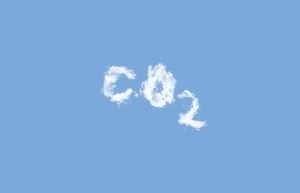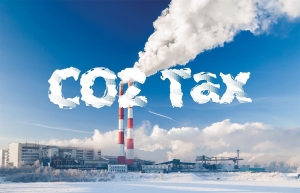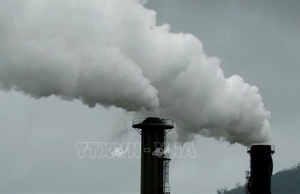Vietnam poised to become large-scale carbon credit market
 |
The Organisation for Forest Financing (Emergent) and members of the Lowering Emissions by Accelerating Forest Finance (LEAF) Coalition visited Vietnam from September 26 to 29 to negotiate ERPAs.
The south central and Central Highlands regions, with a total forest area of about 4.29 million hectares (3.16 million ha of natural forests and 1.13 million ha of planted forests) account for over 29 per cent of the country's forest area and are of considerable importance. To implement the LEAF initiative, forest resources that are high in biodiversity have been selected.
Nguyen Thi Bich Ngoc, a representative of Emergent said, "The LEAF Coalition was established in April 2021 with the view to putting an end to deforestation and forest degradation by providing financing for tropical forest protection on a scale of more than 2.5 million ha.
All forest carbon credit transactions via the LEAF Coalition are registered and issued by the independent Architecture for REDD+ Transactions (ART) programme under the REDD+ Environmental Excellence Standard (TREES).
The LEAF Coalition is supported by four governments (the United Kingdom, the United States, Norway, and South Korea) and over 25 major companies (including Amazon, PwC, and Unilever) that have committed to tackling deforestation.
LEAF only buys credits that meet ART’s TREES, consulting and sharing the benefits with local communities and ethnic minority communities, and strictly controlling the use of proceeds. LEAF’s strict buyers’ criteria also ensure high levels of integrity from private sector clients.
"Up to $1 billion is available for distribution to nations with forest protection initiatives, such as Vietnam. It stands as a testament to the nation's efforts to fulfill its COP26 and Paris Agreement commitments," Ngoc added.
In the same vein, Mette Moglestue, Norwegian deputy head of mission in Vietnam said, "The world's current deforestation and forest degradation rates are partly due to the lack of financial mechanisms for investment. We will continue our support for Vietnam's forest protection and development efforts while maintaining the livelihoods of local people and communities."
Additionally, at COP26, the Vietnamese Ministry of Agriculture and Rural Development inked a Letter of Intent with the Director of Emergent, LEAF's administrative management agency, on emissions reductions. This lay the foundation for the two parties to negotiate, sign, and implement the ERPAs for forests in 11 provinces in the south central and Central Highlands regions.
According to the letter, Vietnam aims to transfer 5.15 million tonnes of CO2 emissions reductions to LEAF and Emergent between 2022 and 2026, at a minimum price of $10 per tonne. The credits transferred to LEAF will be counted towards Vietnam's National Determined Contributions (NDC) commitment.
To realise its NDC, Vietnam aims to use its national resources to reduce 15.8 per cent of its emissions, equivalent to 146 million tonnes of CO2, with claims that the figures could be raised to 43.5 per cent and 403 million tonnes with international support.
 | Vietnam receives $41 million from World Bank for sale of forest carbon credits Vietnam has received over $41 million from World Bank for sale of forest carbon credits, equal to 80 per cent of the committed amount under the Emission Reductions Payment Agreement. |
 | Export carbon tax options on the table Two options for enacting a carbon tax scheme have been proposed to mitigate the impact of the EU’s carbon border adjustment mechanism on exporters. |
 | Vietnam makes efforts to develop domestic carbon market In the context that about 70 countries and territories have applied carbon pricing instruments, experts held that Vietnam should also apply such tools, especially by developing the domestic carbon market, in order to support the realisation of the country’s greenhouse gas (GHG) emissions reduction target. |
What the stars mean:
★ Poor ★ ★ Promising ★★★ Good ★★★★ Very good ★★★★★ Exceptional
 Tag:
Tag:
Related Contents
Latest News
More News
- $100 million initiative launched to protect forests and boost rural incomes (January 30, 2026 | 15:18)
- Trung Nam-Sideros River consortium wins bid for LNG venture (January 30, 2026 | 11:16)
- Vietnam moves towards market-based fuel management with E10 rollout (January 30, 2026 | 11:10)
- Envision Energy, REE Group partner on 128MW wind projects (January 30, 2026 | 10:58)
- Vingroup consults on carbon credits for electric vehicle charging network (January 28, 2026 | 11:04)
- Bac Ai Pumped Storage Hydropower Plant to enter peak construction phase (January 27, 2026 | 08:00)
- ASEAN could scale up sustainable aviation fuel by 2050 (January 24, 2026 | 10:19)
- 64,000 hectares of sea allocated for offshore wind surveys (January 22, 2026 | 20:23)
- EVN secures financing for Quang Trach II LNG power plant (January 17, 2026 | 15:55)
- PC1 teams up with DENZAI on regional wind projects (January 16, 2026 | 21:18)






















 Mobile Version
Mobile Version